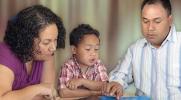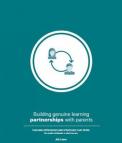You are here:
- Home >
- Engaging with parents
Engaging Pacific parents and communities
Thanks for visiting Pasifika Education Community.
We are preparing to close this site soon as this content has now moved to Tāhūrangi.
Tāhūrangi is the new online curriculum hub for Te Tāhuhu o te Mātauranga | Ministry of Education.
About
A fia vave o’o lou va’a, alo na o oe, ae a fia tuli mamao le taunu’uga, tatou ‘alo’alo faatasi.
If you want your canoe to go fast, go alone; if you want to go further, let us go together.

Community engagement is "meaningful, respectful partnership between schools and their parents, whānau, and communities ... focused on improving the educational experiences and successes for each child." ( Partners in Learning, ERO, 2008).
Community engagement principle
One of the eight principles of the New Zealand Curriculum and is part of what underpins all school curriculum decision-making.
The Pacific community is diverse – ethnically, generationally, economically, and in language use. Strong relationships and links between schools and Pacific parents, families, and communities are more powerful when they are reciprocal and have a clear focus on student learning.
Engaging with Pacific parents and communities is as crucial for a school with one Pacific student as it is for those schools with many. Parents and families of Pacific learners expect the school will:
- care about their children
- help them to learn
- support them to achieve.
They want schools to be open, inclusive places. Parents and families want teachers who believe in their children’s potential to learn and support them to achieve that potential.
Action Plan for Pacific Education
Action Plan for Pacific Education 2020–2030
Has a vision that diverse Pacific learners and their families feel safe, valued and equipped to achieve their education aspirations.
It identifies five key focus areas for change that are needed to achieve this vision:
- work reciprocally with diverse Pacific communities to respond to unmet needs, with an initial focus on needs arising from the COVID-19 pandemic
- confront systemic racism and discrimination in education
- enable every teacher, leader and educational professional to take coordinated action to become culturally competent with diverse Pacific learners
- partner with families to design education opportunities together with teachers, leaders and educational professionals so aspirations for learning and employment can be met
- grow, retain and value highly competent teachers, leaders and educational professionals with diverse Pacific whakapapa.
Improving Education outcomes for Pacific learners (ERO, 2012)
This document tells us that by putting into practice the Action Plan, parents can:
- share their own thoughts and ideas about what they and the community are doing to contribute to their child’s learning at school
- receive practical advice from teachers on what they can do to help their child to achieve academically
- understand the purpose in connecting with the school and its representatives and doing so with confidence.
What helps Pacific parents engage with their child's school?
Consulting with Pacific parents has helped to identify a range of initiatives that help them to engage with schools. These include:
- a variety of communication methods, such as face-to-face communication, newsletters translated into first languages, telephone contact, and home-school communication notebooks
- more frequent contact about their children’s progress, especially when the school is celebrating their achievements
- meetings with other parents to discuss common interests, issues, and ways to help their children with learning
- formal home-school partnerships, especially those focused on literacy and numeracy and those that acknowledge and respect their children’s culture
- a homework centre at their child’s school
- information meetings, for example, a session about NCEA
- access to interpreters or community liaison people
- having a staff member as a key contact or liaison person for Pacific families and a senior manager responsible for Pacific students.
from Gorinski, R., and Fraser, C. (2006) Literature review on the effective engagement of Pasifika parents and communities in education.
What could our school do?
Identify what suits your school community. Create spaces where parents can come, see themselves and their culture reflected in the environment, and feel able to connect with each other as well as school staff. Consider the needs of the community – can they bring their pre-schoolers, share food, ask questions, and share their ideas openly. Identify other venues that the community feel part of, such as a local church or community centre where you can meet to discuss things such the creation of school policies and procedures.
Support teachers to identify:
- ways of regularly connecting with the parents of each Pacific learner in their class in a ways that work for the parents.
- how to share positive feedback with parents and support parents to understand what they should be aware of and how to support their child's learning.
The tabs tools, resources, and examples have information to help your school engage with your Pacific community in a way that suits everyone best.
Further reading

Building genuine learning partnerships with parents (ERO, 2018)
This report is part of a series about teaching strategies that work. It features strategies and approaches we saw in 40 primary schools across New Zealand.
